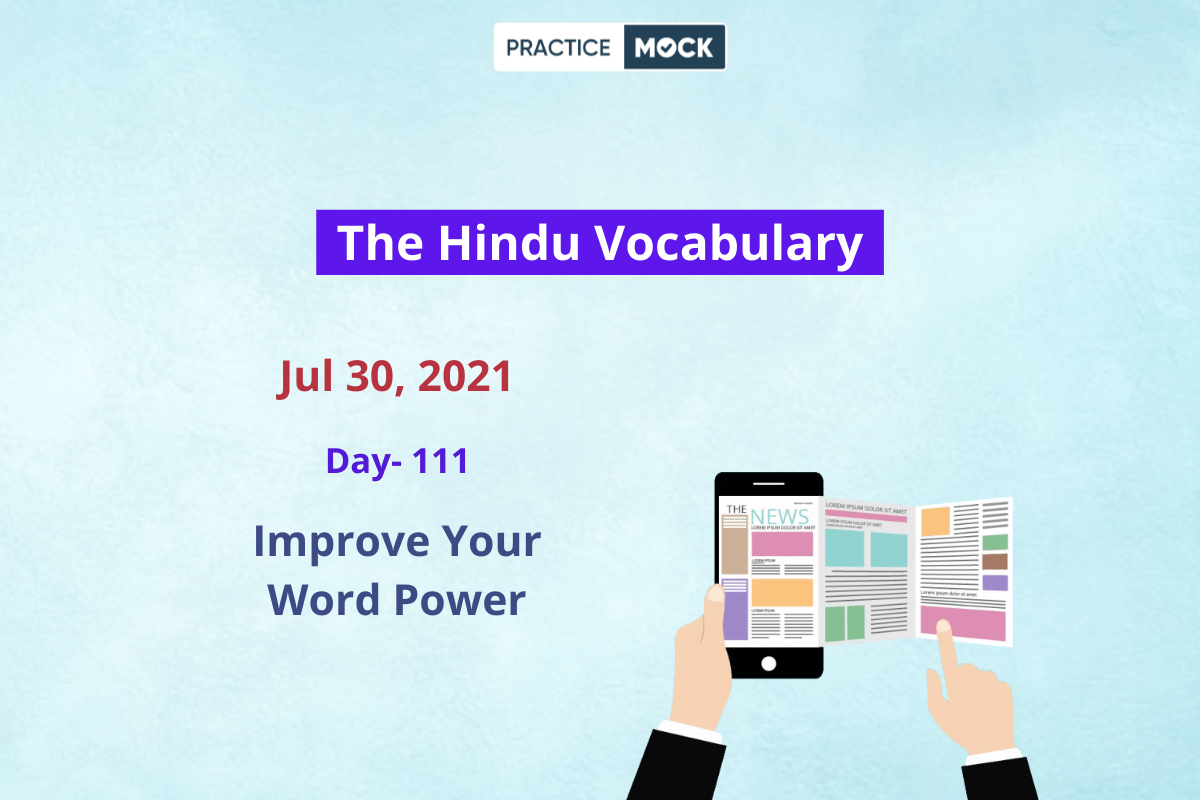We hope that these editorial articles are helping you in your exam preparation. This series of Editorials’ Difficult Words will help you to understand the editorials of The Hindu in a better way. Today we have come up with the explanation of difficult words/phrases of the below editorial. Have a look and update your word power & general awareness by going through this editorial.
| Difficult Word/ Phrase | Contextual Sense |
| Chug | to move steadily |
| Sporadic | occurring at irregular intervals or only in a few places |
| Frenetic | fast and energetic in a rather wild and uncontrolled way |
| Plasmid | a small, circular, double-stranded DNA molecule that is distinct from a cell’s chromosomal DNA |
| Efficacy | the ability to produce a desired or intended result |
| Adolescent | (of a young person) in the process of developing from a child into an adult |
| Cohort | a group of people banded together or treated as a group |
| Undergird | secure or fasten from the underside |
| Ramp up | increase the level or amount of something sharply |
| Staggered | arrange (events, payments, hours, etc.) so that they do not occur at the same time |

Vaccinating the young: On priority groups
India must continue to prioritise vaccination of the adult population
As India’s vaccination drive chugs (to move steadily) along with sporadic (occurring at irregular intervals or only in a few places) bursts of frenetic (fast and energetic in a rather wild and uncontrolled way) inoculation, there are possibilities of administering vaccines to children soon — as early as next month. At present, two Indian vaccines may be eligible for administration to children. Zydus Cadilla’s ZycoV-D, a three-dose plasmid (a small, circular, double-stranded DNA molecule that is distinct from a cell’s chromosomal DNA) DNA vaccine, with a 66.6% efficacy (the ability to produce a desired or intended result) in phase-3 trials, has also been tested in adolescents ((of a young person) in the process of developing from a child into an adult) (12-18 years), data for which has been submitted to the regulator. The company has also requested permission to test in children over five. Covaxin’s Bharat Biotech is also testing the vaccine in a cohort (a group of people banded together or treated as a group) of children below 12. Though none of these studies has been completed, the expectations are that these vaccines may be ready by September. Pfizer’s mRNA vaccine has been authorised in those above 12 and Moderna’s too may be similarly approved in the U.S. Both companies are reportedly in discussions with the Indian government. Young children are at the least risk of hospitalisation and death from COVID-19 but are capable of being infection carriers and putting older caregivers at risk. This undergirds (secure or fasten from the underside) the difficult decision by governments to continue with school closures that has brought forth unprecedented challenges such as denying many Indian children access to quality education.

From the global experience so far, the broad principle is that if an effective vaccine is available, it must be administered irrespective of age. However, it is also true that the vaccines are far more effective at protecting from disease than infection. Because children and adults respond to the virus differently, it still remains to be seen whether vaccinating children as a pre-requisite to opening schools actually brings down overall rates of infection. Countries that have vaccinated those above 12 and have fully opened up are also those boasting high rates of adult vaccination. In India, only around 10% of all adults have been fully vaccinated. India already has a challenging target of fully inoculating all adults — 94.4 crore — by the end of the year. A key constraint has been Covaxin; its manufacturer has been unable to ramp up (increase the level or amount of something sharply) monthly production to its stated nearly six crore doses. Put together, this implies that if the aim of universal vaccination is to protect from disease, then the thrust must be on prioritising adults over children. Government and independent experts have advised that schools can open in a staggered (arrange (events, payments, hours, etc.) so that they do not occur at the same time) fashion. This again underlines that reopening should not be contingent on vaccination alone. There is also the worry that prioritising vaccines for children would mean diverting already limited stocks. Rather than blindly emulate the West, India must decide on what policy works best for its entire population, including children.
Hope you got to know some new words/phrases which will definitely be useful in the English section of upcoming competitive exams. Wishing you all the best for your preparation!
Want to improve your vocabulary further? Download the Lists of Word-Meanings of Previous Months here.

- Sign Up on Practicemock for Updated Current Affairs, Free Topic Tests and Free Mini Mocks
- Sign Up Here to Download Free Study Material
Free Mock Tests for the Upcoming Exams
- IBPS PO Free Mock Test
- RBI Grade B Free Mock Test
- IBPS SO Free Mock Test
- NABARD Grade A Free Mock Test
- SSC CGL Free Mock Test
- IBPS Clerk Free Mock Test
- IBPS RRB PO Free Mock Test
- IBPS RRB Clerk Free Mock Test
- RRB NTPC Free Mock Test
- SSC MTS Free Mock Test
- SSC Strenographer Free Mock Test
- GATE Mechanical Free Mock Test
- GATE Civil Free Mock Test
- RRB ALP Free Mock Test
- SSC CPO Free Mock Test
- AFCAT Free Mock Test
- SEBI Grade A Free Mock Test
- IFSCA Grade A Free Mock Test
- RRB JE Free Mock Test
- Free Banking Live Test
- Free SSC Live Test



